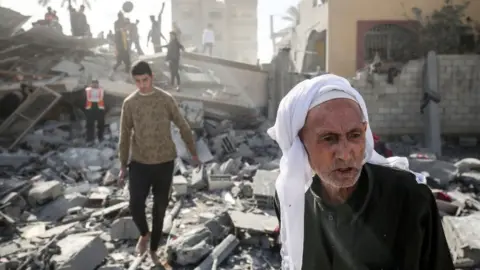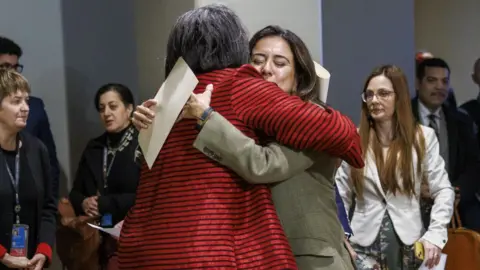UN Security Council backs ramping up Gaza aid, but no ceasefire
 Getty Images
Getty ImagesThe UN Security Council (UNSC) has adopted a resolution urging more aid for the Gaza Strip, but falling short of a call for an immediate ceasefire between Israel and Hamas.
The vote followed days of negotiations to avoid a veto by the US, a permanent UNSC member and a key ally of Israel.
UN chief António Guterres said the "real problem" to delivering aid was Israel's ongoing offensive.
The UN has warned Gaza is at risk of famine if the war continues.
Israel has launched a massive military campaign aimed at eliminating Hamas, following the 7 October attack in which militants killed at least 1,200 in southern Israel and took more than 240 hostage.
At least 20,000 people have been killed in the Gaza Strip since, according to the Hamas-run health ministry.
Friday's resolution was introduced by the United Arab Emirates.
Minutes before the vote, Russia - one of the five permanent members of the council - introduced an amendment to revert to an earlier draft calling for an immediate ceasefire. It argued the text gave Israel freedom of movement to further clear the Gaza Strip.
The Russian amendment was defeated and both Russia and the US went on to abstain, while the other 13 members of the council backed the text that now calls for creating conditions "for a sustainable cessation of hostilities".
The resolution said it aimed to introduce "extended humanitarian pauses and corridors throughout the Gaza Strip".
It demanded that parties "allow, facilitate and enable the immediate, safe and unhindered delivery of humanitarian assistance at scale directly to the Palestinian civilian population throughout the Gaza Strip".
The resolution calls for the appointment of coordinator to oversee a UN mechanism that will be set up with the goal of speeding up and streamlining the distribution of aid.
Washington initially feared that would take away Israel's control of the screening process - but the resolution made clear it would be in consultation with all relevant parties.
Reacting to the resolution, Hamas criticised what it said was an "insufficient step" to meet the humanitarian needs of people in Gaza, and accused the US of working hard to "empty this resolution of its essence".
The resolution calls for "the immediate and unconditional release of all hostages" - and the Israel Defence Forces spokesman Rear Adm Daniel Hagari urged the international community and international organisations to enforce it.
 EPA
EPAWhile voting by the UN Security Council took place in New York, fighting continued to rage between Israel and Hamas.
Israel has expanded its ground offensive in central Gaza after it issued an evacuation order to residents of Al-Bureij, telling them to move further south. Nearly 400 people died in Gaza in the last 48 hours, according to the Hamas-run health ministry.
A quarter of households - roughly 500,000 people - are facing "catastrophic conditions", a UN food security agency found.
It says the territory's entire population of roughly 2.2 million people is suffering acute food shortages.
"No-one in Gaza is safe from starvation," said Cindy McCain from the UN's World Food Programme (WFP).
Trucks have been bringing aid into Gaza from Egypt for weeks, but the WFP recently estimated that just 10% of the food needed is currently getting into the territory.
Talks have been taking place in Egypt to reach a new truce - similar to the week-long pause in fighting last month that saw 110 hostages released.
But on Thursday they suffered a setback when Hamas said it would not agree to a release of some hostages in exchange for a partial ceasefire.
It said Palestinian groups had rejected the prospect of more hostages being released until Israel agrees to end the war.
Israel has repeatedly rejected a permanent ceasefire.
After Friday's vote at the UNSC, the UK's Foreign Secretary David Cameron said "a sustainable ceasefire must mean that Hamas is no longer there, able to threaten Israel with rocket attacks and other forms of terrorism".
